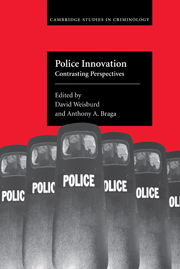Book contents
- Frontmatter
- Contents
- List of figures
- List of tables
- Notes on contributors
- 1 Introduction: understanding police innovation
- Part I Community policing
- Part II Broken windows policing
- Part III Problem-oriented policing
- Part IV Pulling levers policing
- Part V Third-party policing
- Part VI Hot spots policing
- Part VII Compstat
- Part VIII Evidence-based policing
- 16 Advocate Evidence-based policing for crime prevention
- 17 Critic Improving police through expertise, experience, and experiments
- 18 Conclusion: Police innovation and the future of policing
- Index
- References
17 - Critic Improving police through expertise, experience, and experiments
Published online by Cambridge University Press: 22 September 2009
- Frontmatter
- Contents
- List of figures
- List of tables
- Notes on contributors
- 1 Introduction: understanding police innovation
- Part I Community policing
- Part II Broken windows policing
- Part III Problem-oriented policing
- Part IV Pulling levers policing
- Part V Third-party policing
- Part VI Hot spots policing
- Part VII Compstat
- Part VIII Evidence-based policing
- 16 Advocate Evidence-based policing for crime prevention
- 17 Critic Improving police through expertise, experience, and experiments
- 18 Conclusion: Police innovation and the future of policing
- Index
- References
Summary
The words “expertise,” “experience,” and “experiment” all come from the same Latin root: ex per, and it means from danger. The common root suggests that at one time in human history, these ideas were closely connected with one another. Interpreting unforgivably, we might conclude that human beings have long been aware of the danger of acting with uncertain knowledge of consequences; further, that an important way to reduce this danger was to rely on the expertise that was rooted in experience of which one important type was an experiment.
The commitment to “evidence-based policing” is today's effort to reduce the danger associated with relying on police practices and methods whose consequences are, in an important sense, unknown, or at least uncertain. The proposed solution lies in the careful accumulation of actual concrete experience with particular police methods to discover which methods seem to work to produce desired results. But the focus on evidence-based, rather than experience-based knowledge suggests that it is not just any old experience that can be used in developing a more solid base for action. It is not, for example, the kind of experience we recognize as commonsense. Nor is it the kind that accumulates as police lore. It is not even the kind of experience captured in detailed case studies. It is instead the kind of experience that is captured in observational studies that reduce experience to numbers that can be systematically analyzed to discover the generality and reliability with which a particular intervention produces desired results.
- Type
- Chapter
- Information
- Police InnovationContrasting Perspectives, pp. 322 - 338Publisher: Cambridge University PressPrint publication year: 2006
References
- 22
- Cited by

